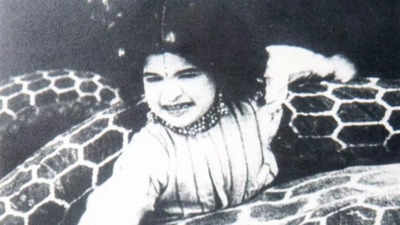silent film
Kaliya Mardan will be screened with a live orchestra at IFFI this year. Speaking to ETimes,
Chandrashekhar Pusalkar
, Phalke’s grandnephew, expressed his excitement, saying, “I’m happy that this film is being screened at an international level. I’m thankful to the government. This is one of Dadasaheb’s most memorable films, and it had the longest run, lasting five years. The highlight of the film was the beautiful acting by his five-year-old daughter, Mandakini, and some great trick photography by Phalke.”
Kaliya Mardan (1919) has been restored in 4K using the surviving 35mm dupe negative preserved by NFDC–National Film Archive of India. The original nitrate elements no longer exist, and only 4,441 feet of the film’s original 6,000-foot length have survived. The restoration process involved meticulous efforts to digitally clean and stabilize the surviving footage while preserving its historical authenticity. This restoration makes
Kaliya Mardan
one of the first silent Indian films to undergo 4K restoration under the National Film Heritage Mission, setting a significant benchmark for preserving early Indian cinema.
Amitabh Bachchan receives Dadasaheb Phalke award
Kaliya Mardan (1919), directed by Dadasaheb Phalke, is a significant milestone in the history of Indian cinema. Known as the father of Indian cinema, Phalke created this silent film inspired by
Indian mythology
, showcasing his storytelling brilliance and technical innovation. The film depicts the story of
Lord Krishna
’s childhood adventure where he subdues the serpent Kaliya in the Yamuna river, a tale beloved across India.
This movie is particularly remembered for the captivating performance of Phalke’s five-year-old daughter,
Mandakini Phalke
, who portrayed the young Krishna with charm and innocence. Her lively expressions and natural acting brought the divine character to life, making her a child star of her time.
Over a century later, Kaliya Mardan continues to inspire admiration.


